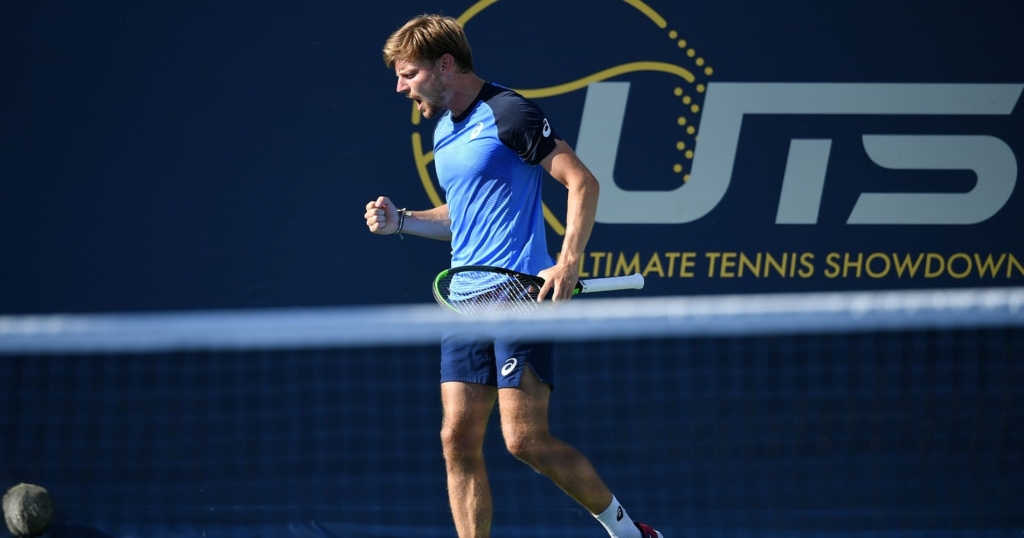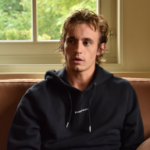Good to hear an outside voice: Players are not alone at UTS
With the interviews between each quarter and the coaching timeouts, the players at the UTS are not alone on the court. A help that can be invaluable.
 Matteo Berrettini, Richard Gasquet, Dustin Brown, Stefanos Tsitsipas… les joueurs de l’UTS ne sont plus seuls sur le court.
Matteo Berrettini, Richard Gasquet, Dustin Brown, Stefanos Tsitsipas… les joueurs de l’UTS ne sont plus seuls sur le court.
It’s a scene to make you smile. After the second quarter of his match with David Goffin on day 6 of the Ultimate Tennis Showdown (a match he lost 3-1), Elliot Benchetrit is interviewed, after the Belgian, by the tournament commentators. Headset attached to his head, microphone planted in front of his lips, the Frenchman teases the commentators for making him wait. “Did you forget me?” he asked. “You spoke to him for one minute, 20, you gave him too much advice. It’s not fair!” And Benchetrit, who replaced the injured Dustin Brown that day, continued in good heart: “After the first quarter, you gave me only one minute of advice – that’s why I lost. It’s your fault.”
Meanwhile, Karen… er… Elliot would like to speak to the manager 😅#UTShowdown | @elbenchetrit pic.twitter.com/Y0lhPt6qWM
— UTS | Ultimate Tennis Showdown (@UTShowdown) June 28, 2020
If Benchetrit is in teasing mood, the exchange reveals just how immersed the players are with the rules that allow them to interact with their coaches during timeouts and with the commentators between each quarter, which replace traditional sets, in the UTS. During these interviews, which are broadcast live, the players are no longer left alone on the bench, as they are on the ATP Tour. They now have to answer questions from two commentators.
After three weeks of competition, the players have almost become partners. Following his defeat by Richard Gasquet on Sunday (3-1), the Frenchman Corentin Moutet collared Pete Odgers, the English commentator who questioned the players during the breaks, with Jenny Drummond, his Scottish co-commentator.
“You really helped me!” he said, looking up to the terrace of the Mouratoglou Tennis Academy, which overlooks the centre court. “It was really good to speak to you during the match, to get some advice and to release my emotions.“
Later, the world No 75 told Tennis Majors that, during the match, he had felt “nervous”. “So it was nice to have some outside help. Sometimes, I feel alone on the court.” Benchetrit talks of “self-reflection during the interviews”.
Even the world’s best are appreciating this new interaction. Stefanos Tsitsipas the first. On Saturday, while he was trailing by two quarters to love against Feliciano Lopez, the world No 6 pocketed the third set to complete the first part of his victorious comeback. He then relished the fact that: “I don’t have to sit alone on my bench, like during ATP Tour matches!”
– “Can we can come with you in your matches on the ATP Tour?” (to ask questions during the matches), asked Pete Odgers.
– “Come with me, please!” said the world No 6. “It would be a good idea to put that in place on the ATP Tour!”
Tsitsipas recovered to win the match in sudden death (3-2), after a comeback never achieved before in the competition.
Kerei Abakar, co-coach of Tsitsipas: “I told him not to be afraid to talk crap”
The following day, a surreal exchange with the same player. After the second quarter of his easy win over Alexei Popyrin (3-1), The Greek God thinks about paying homage to Justin Timberlake, but starts to sing Apologize, from One Republic, featuring Timbaland.
[bloc_twitter src=”https://twitter.com/UTShowdown/status/1277343044166209536?s=20″]
“I told him not to be afraid to talk crap!, said Kerei Abakar, the co-coach of Tsitsipas. He’s relaxed with them, he’s natural, it’s the real Stefanos Tsitsipas!”. Abakar is full of praise for the commentators, “real personalities who put the players at ease.”
The commentators, Jenny Drummond and Pete Odgers, have become real characters in the game. Tennis advice, humour, flattery; the two commentators take their role to heart. “Even if you lose a quarter, you talk to the commentators, you make a joke, and then you’re more relaxed to get back into the game,” explains Goffin.
The task is not so simple for the two commentators, who must question the players right in the heart of the battle. “The most interesting thing is to discover the hidden side of the players”, says Jenny Drummond, after a game of tennis in the heat of the south of France. “Sunday night, Tsitsipas was hilarious! No one had ever seen him like that before, singing. You get to know everyone’s personality, even a World No 6.”

Drummond believes the interviews between quarters allow players to “escape the formulaic speeches”. “Usually,” she continues, “when you interview players, it’s either after the match or at a press conference. The players know exactly what they’re going to say. Here, thanks to the emotions on the court, you get a reaction that you never normally get.”
Several players have managed to get back into the match after the interviews between the quarters. Just like last weekend. Tsitsipas recovered to beat Lopez (3-2), Goffin beat Benchetrit after losing the first quarter (3-1), before Lopez did the same thing against Benoit Paire (3-1), taking advantage of the Frenchman’s mistakes.
The commentators are not the only ones earning a bigger role at the UTS. It’s the same for the coaches. They can call a timeout once every quarter, and thanks to headsets and microphones, viewers can see and hear their exchanges.
Wolfgang Thiem is particularly fond of the concept and has used almost all the timeouts at his disposal since the start of the tournament. Against Goffin on Saturday, the father and coach of Dominic advised his son to “serve hard and go to the net”, in an effort to maximise the UTS card which gives three points for a winner. The Austrian world No 3, who has been getting stronger in this UTS, succeeded in bringing down Goffin (3-1).
[bloc_twitter src=”https://twitter.com/UTShowdown/status/1276984863053303815?s=20″]
Brown : “Getting inside the players’ brains”
Goffin and his coach Thomas Johansson are also adept at using the coaching timeout. “When you’re under pressure, a little stressed, it’s good to be able to talk to your coach,” Goffin says. “On the next point you’re going to feel more relaxed. “
The Belgian uses his victory on Sunday over Benchetrit (3-1) as an example. “My coach gave me back my confidence after the first quarter that I lost, Goffin told Tennis Majors. He told me which area I should hit to hurt him. And the next three points were perfect.”

These devices allow “viewers to get inside the mind of the players“, according to Dustin Brown. He sees it mainly as an experience “for fans, who can understand the work a player is doing on himself”, but he says it makes no difference on the court. “Whether I say what I think or keep it in my head, it doesn’t make a difference to me.” But it makes a difference to the show.










